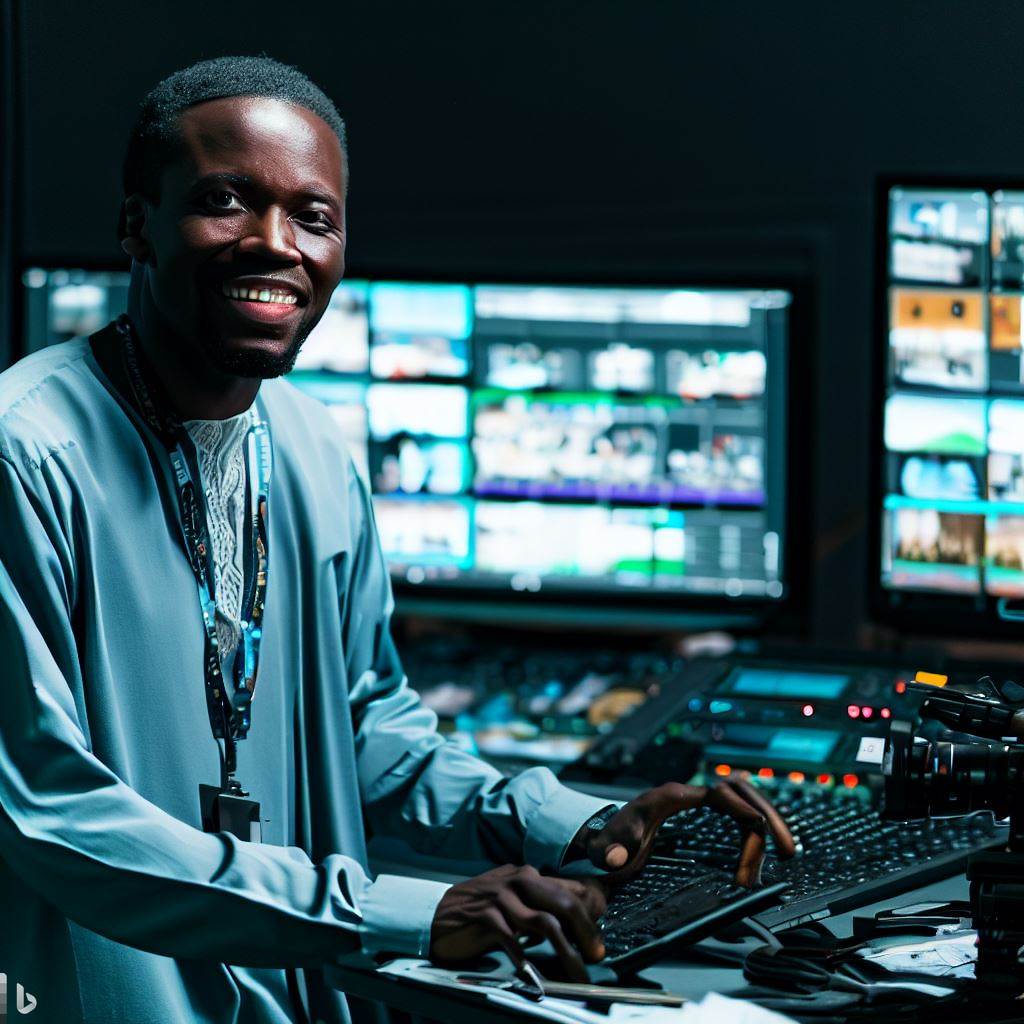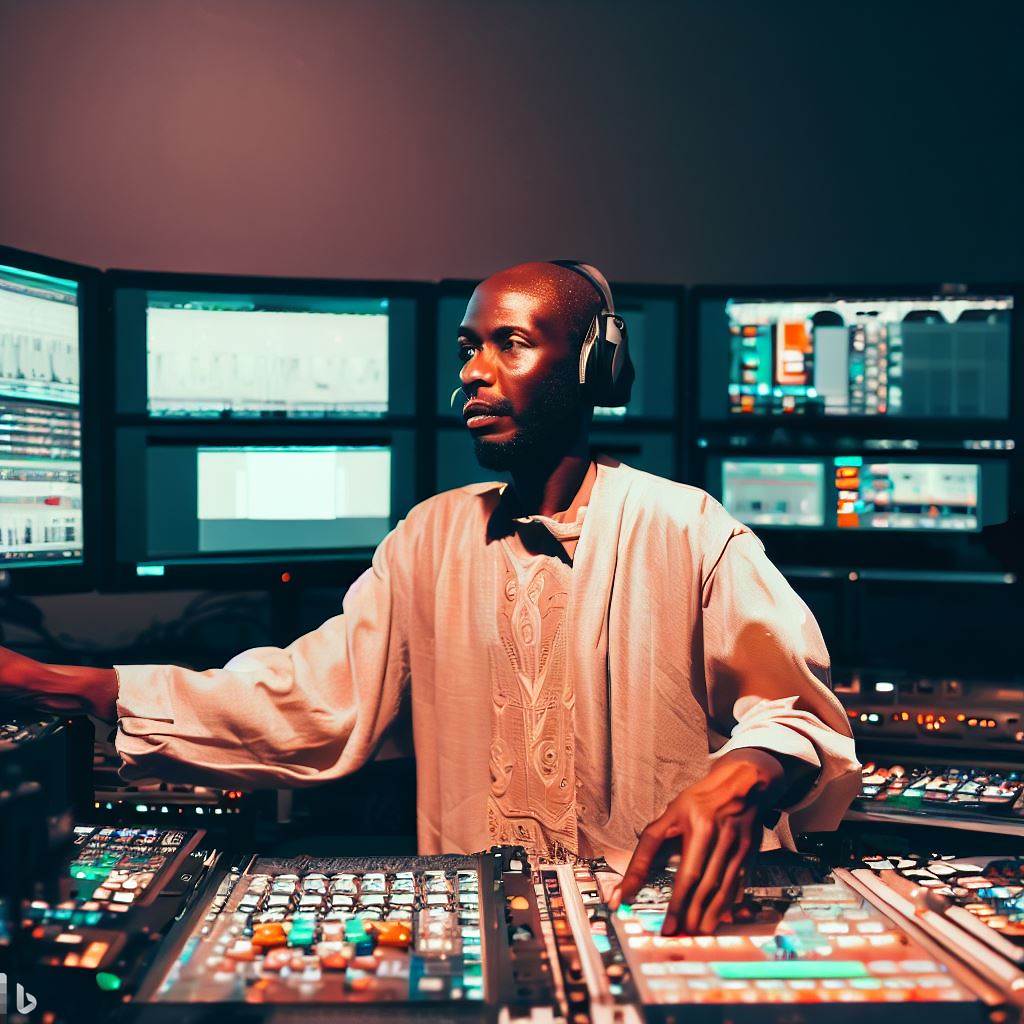Introduction
In the bustling realm of Nigerian TV reporting, networking reigns supreme.
Connections drive success, enabling TV reporters to thrive. The industry, vibrant and competitive, demands strong alliances for progress.
Thus, this section asserts that building networks is an indisputable cornerstone for TV reporters in Nigeria.
Importance of Building Networks
- Facilitates access to exclusive stories.
- Enhances credibility through trusted sources.
- Offers collaborative opportunities for in-depth coverage.
Overview of the Nigerian TV Reporting Industry
- Booming media landscape with numerous channels.
- Varied content, from news to entertainment.
- High demand for real-time, localized updates.
Thesis Statement
In the Nigerian TV reporting sphere, forging networks stands as an imperative. Connections propel reporters toward success and excellence.
Building Networks with Industry Professionals
Building networks is the lifeline of success for TV reporters in Nigeria.
Active networking opens doors to opportunities, insights, and growth in this dynamic field.
Here, we delve into the vital aspects of connecting with industry professionals.
1. Attending Industry Events and Conferences
Attending industry events and conferences is like opening a treasure chest of knowledge and contacts.
These gatherings are melting pots of ideas and a hub for experts.
Meeting face-to-face with fellow reporters, producers, and industry leaders can create opportunities you never thought possible.
2. Participating in Professional Organizations and Associations
Joining professional organizations and associations is a strategic move.
Being part of these groups not only provides a platform to share experiences but also offers access to exclusive resources and training opportunities
Associations like the Nigeria Union of Journalists (NUJ) can be a great starting point.
3. Networking with Experts and Veterans in the Field
- Networking is not just about quantity; it’s about quality.
- Seek out experts and veterans in the field.
- Engaging in meaningful conversations and learning from their experiences can be a game-changer.
- Don’t hesitate to approach them at events or connect through social media.
4. Importance of Mentorship from Experienced Reporters
- A mentor can guide you through the labyrinth of TV reporting.
- They offer insights, advice, and emotional support.
- Look for experienced reporters willing to take you under their wing.
- Their wisdom can save you from common pitfalls.
5. Developing Relationships with Cameramen, Sound Engineers, and Production Crews
- TV reporting is a collaborative effort. Building strong relationships with your crew is paramount.
- Cameramen, sound engineers, and production crews are the unsung heroes behind the scenes.
- Show appreciation for their work, and they’ll have your back when it matters most.
In the competitive realm of TV reporting, networking is crucial, aiding in interviews, information gathering, and navigating challenges.
Begin by attending industry events and conferences to expand your connections.
Professional organizations provide contacts and mentorship opportunities, elevating credibility and collaboration prospects.
Prioritize quality connections, seeking insights from industry veterans who can introduce you to key figures.
Mentorship from experienced reporters offers guidance, feedback, and a support system during tough times.
Value your team, including cameramen and production crews, fostering a cooperative work environment that enhances reporting.
In summary, networking is vital for Nigerian TV reporters’ success. From conferences to mentorship, connections drive growth and achievement. Start building bridges and elevate your career.
Networking with Fellow Reporters
In the dynamic realm of Nigerian journalism, networking proves pivotal for TV reporters.
A well-forged network among peers can amplify career prospects and usher in opportunities.
Here’s why connecting with fellow reporters matters:
- Story Collaborations: Networking fosters potential collaborations for impactful storytelling, enriching the depth and influence of TV journalism.
- Resource Sharing: Sharing resources and intel enhances reporting quality—be it research insights, documents, or contacts—ultimately enhancing news coverage.
- Contacts and Leads Exchange: A robust network offers access to valuable leads and contacts, unveiling sources and exclusive information otherwise elusive.
- Unified Presence: Attending events together forges camaraderie, strengthens professional ties, and bolsters credibility among sources and audiences.
- Online Communities: Engaging in reporter forums and digital groups encourages peer learning, experience sharing, advice seeking, and skill enhancement.
In the Nigerian TV journalism landscape, networking presents a gateway to success.
Collaborative stories, pooled resources, shared leads, unified event attendance, and virtual community participation propel reporters forward.
By investing in networking efforts—event attendance, reaching out, active online engagement—TV journalists solidify their foothold and thrive in a fiercely competitive field.
The Role of Social Media in Building Networks
In today’s digital age, social media plays a crucial role in building networks for TV reporters in Nigeria. Here’s how:
Creating a professional online presence
Social media platforms such as Twitter, Facebook, and LinkedIn provide TV reporters with a platform to create a professional online presence.
By posting relevant content, sharing insights, and engaging with their audience, TV reporters can showcase their expertise and establish themselves as credible professionals in the industry.
Utilizing platforms such as Twitter, Facebook, and LinkedIn
TV reporters can leverage platforms like Twitter, Facebook, and LinkedIn to expand their networks and connect with industry professionals.
These platforms offer opportunities to join relevant groups, participate in discussions, and connect with influential individuals, which can lead to valuable networking opportunities.
Engaging with followers, viewers, and industry professionals
Engaging with followers, viewers, and industry professionals through social media allows TV reporters to build meaningful connections.
By responding to comments, answering questions, and participating in conversations, reporters can foster relationships and establish a loyal following.
Sharing work and showcasing skills
Social media platforms provide TV reporters with a platform to share their work and showcase their skills.
They can post clips or snippets of their reports, creating a portfolio of their best work. This allows potential employers or collaborators to see their capabilities and expertise.
Leveraging social media for news gathering and sourcing
Social media platforms can act as powerful tools for TV reporters to gather news and source stories.
By following relevant accounts, monitoring trending topics, and utilizing advanced search features, reporters can find stories, gather information, and connect with sources.
All in all, social media plays a vital role in building networks for TV reporters in Nigeria.
By creating a professional online presence, utilizing various platforms, engaging with followers and industry professionals, sharing work, and leveraging social media for news gathering, reporters can enhance their networking opportunities and establish themselves as credible professionals in the industry.
Read: Coping with Job Pressure as a TV Reporter in Nigeria

Building Networks with Sources and Contacts
In Nigeria’s fast-paced TV reporting realm, networking is integral to success. Reporters rely on connections to gather information, secure access, and share vital stories.
Key relationships include government officials, PR professionals, and community leaders, granting exclusive interviews, insights, and press events.
Beyond government, reporters collaborate with NGOs, activists, and experts for localized perspectives and grassroots stories.
Establishing bonds with these groups ensures comprehensive, accurate reporting.
Cultivating links with diverse experts like economists and legal scholars enhances news quality.
Credibility is paramount; reporters verify and build trust with sources over time.
Strategies involve genuine relationship-building, attending events, and leveraging social media (Twitter, LinkedIn) for real-time insights.
Networking fosters career growth, mentorship, and collaboration, crucial in Nigeria’s competitive industry.
To summarize, for Nigerian TV reporters, networks amplify exclusive info, diverse viewpoints, and career opportunities. Trust and relationships underpin this ongoing process, enriching journalism.
Read: Difference between Local and National Reporting in Nigeria
See Related Content: Exploring the Role of a Television Editor in Nigeria
Benefits of Building Networks for TV Reporters
Building networks is an essential aspect of being a TV reporter in Nigeria.
It not only helps in gaining access to exclusive stories and information but also opens up increased career opportunities and job prospects.
Let’s explore the benefits of building networks for TV reporters:
1. Access to Exclusive Stories and Information
By building strong networks, TV reporters can establish relationships with key industry players, sources, and experts.
This allows them to gain access to exclusive stories and information that can help in producing high-quality news content.
Networking enables reporters to tap into valuable resources and stay ahead in their reporting.
2. Increased Career Opportunities and Job Prospects
Networking helps TV reporters to expand their professional circle, which in turn leads to increased career opportunities.
Building connections can lead to referrals for new job positions or freelance assignments.
Networking also allows reporters to stay informed about potential openings in the industry and increase their chances of landing their dream job.
3. Support and Guidance from Mentors and Colleagues
Through networking, TV reporters can connect with mentors who have extensive experience and insights in the field.
These mentors can provide valuable guidance, share their knowledge, and offer advice on career progression.
Additionally, networking allows reporters to get support from colleagues who understand the challenges and triumphs of the industry.
4. Enhanced Credibility and Trustworthiness
Building networks with reputable individuals and organizations in the industry enhances a TV reporter’s credibility.
Establishing relationships with trustworthy sources and experts adds to the overall reliability of their news content.
This, in turn, helps in building a solid reputation as a reliable and trustworthy reporter.
5. Professional Growth and Skill Development
Networking opens doors to professional development opportunities such as workshops, conferences, and training programs.
By connecting with industry professionals, TV reporters can gain insights into the latest trends, technologies, and best practices in journalism.
Networking also allows reporters to learn from others’ experiences and skills, fostering their own professional growth.
In fact, building networks is highly beneficial for TV reporters in Nigeria.
It provides access to exclusive stories and information, increases career opportunities, and offers support and guidance from mentors and colleagues.
Networking also enhances a reporter’s credibility, facilitates professional growth, and promotes skill development.
TV reporters who actively engage in networking activities are better equipped to excel in their careers in the dynamic and competitive field of journalism.
Read: Salary Expectations for TV Editors in Nigeria
Challenges and Potential Pitfalls
Building networks as a TV reporter in Nigeria is crucial for professional growth and success.
However, it is not a smooth journey as there are several challenges and potential pitfalls that one must navigate along the way.
In this section, we will explore some of these obstacles and provide strategies to overcome them.
1. Maintaining Ethical Boundaries in Networking
- As a TV reporter, it is essential to maintain ethical boundaries when building networks.
- Avoid getting too close to sources, as it can compromise your objectivity and impartiality.
- Always remember to prioritize the truth and unbiased reporting over personal relationships.
2. Balancing Personal and Professional Relationships
- One of the challenges in networking is finding the right balance between personal and professional relationships.
- Avoid using professional connections solely for personal gain or vice versa.
- Strive to build genuine relationships that go beyond your immediate professional needs.
3. Being Cautious of Fake or Unreliable Contacts
- In the age of social media, it is crucial to be cautious of fake or unreliable contacts.
- Verify the authenticity of potential network connections before relying on them.
- Research their background and credibility to minimize the risk of getting involved with untrustworthy individuals.
4. Overcoming Shyness or Introversion in Networking Situations
- Networking can be particularly challenging for individuals who are shy or introverted.
- Prepare in advance by researching the individuals or groups you will be networking with.
- Practice introducing yourself and engaging in small talk to boost your confidence.
- Focus on listening actively and asking meaningful questions to overcome feelings of self-consciousness.
Building networks as a TV reporter in Nigeria comes with its fair share of challenges and potential pitfalls.
However, by maintaining ethical boundaries, balancing personal and professional relationships, being cautious of fake or unreliable contacts, and overcoming shyness or introversion, you can navigate these obstacles effectively.
Read: Understanding the Nigerian Union of TV Reporters
Conclusion
Building networks is of utmost importance for TV reporters in Nigeria. It is an essential aspect that cannot be overlooked.
Throughout this blog post, we have explored the various ways in which TV reporters can build networks to enhance their career prospects.
By attending industry events, participating in professional organizations, and leveraging social media platforms, TV reporters can expand their network and connect with key stakeholders in the industry.
Additionally, seeking mentorship and building relationships with experienced reporters can provide valuable guidance and insight.
It is crucial for TV reporters in Nigeria to embrace networking as a vital part of their profession.
By doing so, they can stay informed about industry trends, gain access to exclusive opportunities, and establish their credibility.
As the media landscape continues to evolve, it is essential for TV reporters to adapt and embrace networking as an integral aspect of their career growth.
Publish Your Professional Profile, Business or Brand
Showcase your expertise, gain trust, and boost visibility instantly on Professions.ng.
Publish NowIn the end, if you aspire to excel in the TV reporting profession in Nigeria, do not underestimate the power of building networks.
Take action today, attend events, connect with fellow professionals, and leverage digital platforms to expand your network.
Embracing networking will undoubtedly open doors to new opportunities and enhance your career in the long run.




